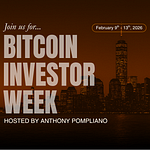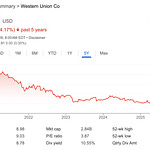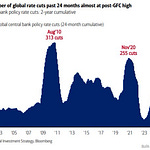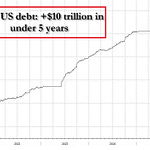If you are not a subscriber of The Pomp Letter, join 215,000 other investors who read my personal opinion on finance, technology, and bitcoin each morning.
To investors,
There was a new ESG campaign launched earlier this week called “Change the Code, Not the Climate.” The goal was to bring awareness to bitcoin’s proof-of-work consensus mechanism, along with a perceived negative environmental impact from the perspective of the campaign creators.
As part of the awareness effort, Ripple co-founder and Executive Chairman Chris Larsen provided $5 million to run campaign advertising across various media outlets. It should be no surprise to anyone reading this that I disagree with the conclusion of this ESG campaign, but I felt it would be important to have a conversation with Chris. While we may disagree on his perspective of bitcoin and proof-of-work, there are plenty of things that we agree on as well.
You can listen to the podcast episode on iTunes or Spotify. I want to spend the rest of our time today discussing my takeaways from the conversation.
To start, this was the first time that I have spoken to Chris Larsen. He seems like a nice guy who genuinely cares about the environment. You have to respect the fact that Chris was willing to come on the podcast to discuss controversial topics with me, especially since it is clear that we vehemently disagree.
Second, both Chris and I have major skin in the game. He has majority of his net worth in crypto, with almost all of it being in XRP, and I have the majority of mine in bitcoin. Chris has also spent nearly $100 million on climate-related issues in the last few years. Some people will say that we are both biased, which could be a fair critique, but the counter-argument is that we both believe deeply in our perspective.
Next, there are two major themes that Chris and I agree on. The first is that a decentralized, digital currency is highly valuable to the world and has the potential to solve a number of global issues. The second is that the free market will always be the referee on winners and losers, regardless of any of our personal opinions.
These two themes are important to call out because they highlight that it is possible to agree with someone on high level ideas, but disagree on the nuance and details. Additionally, the market has deemed bitcoin to be the world’s most valuable digital currency and places a premium on the most popular proof-of-work consensus mechanism.
Next, Chris’ concerns around proof-of-work appear to be rooted in a lack of understanding about what the energy consumption of bitcoin is today. During our conversation, he cites the Cambridge study on bitcoin mining numerous times. When I bring up that Cambridge and the Bitcoin Mining Council both estimate that ~ 66% of bitcoin mining energy consumption comes from renewables, he then says he doesn’t believe that number. For comparison, the United States uses 20% or less renewables as part of the entire country’s energy consumption, so the bitcoin miners are 3x higher than the United States in terms of percentage coming from renewables.
Along these lines, Chris appears to not understand that bitcoin does not have a linear relationship between price and energy consumption. He kept mentioning that bitcoin’s energy consumption increased 10x in the last 5 years, but didn’t want to acknowledge that bitcoin’s price appreciated 4,300% in the same time frame. If we extrapolate this forward, bitcoin’s price would have to cross over $2 million for bitcoin’s energy consumption to increase 10x again.
If this wasn’t enough, Chris also claims that bitcoin mining will consume 4% of global energy production in the future. It is estimated that it costs $200 billion to purchase ~ 0.9% of the global energy production ($0.126 per kWh). This means that miners would have to receive $800 billion in revenue from the block reward and transaction fees, and then spend 100% of the money on power consumption (not to include the cost of facilities or machines), and then they could purchase 4% of global power production.
For comparison, bitcoin miners are making about $45 million per day right now, which comes out to a little less than $16.5 billion per year. This means that bitcoin would have to increase in price to $2.3 million per bitcoin, without any halving to the block reward, and then bitcoin miners would have enough money to purchase this amount of energy. In other words, the claim of 4% of global power consumption is either horrendous math or a disingenuous claim to create fear and outrage.
Another interesting point from the conversation was when I asked Chris about the funding for bitcoin mining critiques. Multiple times I asked whether Chris, Ripple execs, or Ripple’s corporate entity was funding, or had funded, these prior critiques. Chris wouldn’t answer and kept dodging the question. I don’t want to make assumptions, but if the answer was “no” then I would think that it would be easy to say that. The lack of transparency around Ripple, Chris, and other executives’ funding of proof-of-work critiques is concerning.
Next, I asked Chris why he wasn’t advocating for the US dollar to become more green, especially since it is much more popular, and consumes much more energy, than bitcoin. He didn’t seem to have a good answer here.
Lastly, I asked Chris why he was spending money on an awareness campaign, rather than simply forking the bitcoin code and allowing the free market to decide the winning architecture. His answer was that he didn’t know the right technical structure to create to solve his environmental concerns, which I believe is his genuine perspective. It is clear that I don’t know the technical architecture that is better than proof-of-work either, so it feels like identifying a potential problem without a suggested solution is less than ideal.
My motto of “compete, don’t complain” is applicable here. A fork of the code would settle this debate in a fairly efficient manner.
Now I want to make something clear — Chris was kind, articulate, and intelligent. You don’t get to his level of success without being a good entrepreneur. It was great to establish the common ground, especially the things that we agree on, but still have a straightforward conversation about the details that we disagree on.
The world could use more nuanced conversation between people who disagree.
With that said, I think that Chris and the rest of the “Change the Code, Not the Climate” campaign know that there is a 0% chance that they will be successful. This entire campaign appears to be aimed at creating controversy and potential concerns, rather than actually putting forward potential solutions. Not only will the bitcoin miners and developers not agree to any change, but the node operators will reject any change to the consensus mechanism as well.
The market has deemed bitcoin the single most valuable cryptocurrency in the world. It is the most decentralized and the most secure. Every cryptocurrency that received a level of popularity, but did not leverage proof-of-work, has eventually fallen behind in terms of market cap and/or Coinmarketcap rankings.
I appreciate Chris’ appeal to innovators and entrepreneurs. Like him, I believe this group can solve global problems. Bitcoin is that solution though. Proof-of-work is essential to the network’s security and any move away from this consensus mechanism would jeopardize security and value.
But as Chris and I agreed on at the beginning of the conversation, the free market will be the ultimate judge. So far, bitcoin is winning. Only time will tell what happens in the future.
I want to extend a big thank you to Chris. He has my utmost respect for his willingness to engage in the conversation. Hope everyone has a great day. I’ll talk to you tomorrow.
-Pomp
If you are not a subscriber of The Pomp Letter, join 215,000 other investors who read my personal opinion on finance, technology, and bitcoin each morning.
Do you want a job in the crypto industry?
My team and I have been working with the top HR teams in the industry to create a training program that teaches the fundamentals of crypto.
We cover everything from how central banks work to bitcoin’s technical architecture to smart contract platforms to niches of the industry, such as NFTs, DAOs, and much more.
This 3-week intensive program has 50+ events packed into the most valuable training program in crypto. We helped more than 400 people get hired last year and you can be one of them.
Our next cohort starts in April: CLICK HERE TO APPLY.
THE RUNDOWN:
Phoenix Suburb Now Takes Bitcoin for Utility Bills: An Arizona city is allowing residents to pay their utility bills in bitcoin and ether in the latest example of municipal governments embracing cryptocurrencies. Chandler, a Phoenix suburb, on Wednesday said that residents can pay in bitcoin, ether and litecoin held in their PayPal accounts. But the city won’t ever touch those coins; its utility payments processor Invoice Cloud will sell it all for fiat, a press release said. Read more.
Bitcoiner Bruce Fenton Confirms He’s Running for New Hampshire Senate Seat: The former executive director of the Bitcoin Foundation, Bruce Fenton, is officially running for the Republican nomination for New Hampshire’s seat in the U.S. Senate. He’ll be starting his campaign with an injection of $5 million of personal bitcoin wealth. Fenton’s announcement Wednesday confirmed earlier reports the long-time crypto proponent and self-described libertarian was flirting with the idea of a Senate run. Read more.
Galaxy’s Novogratz and Bakkt’s Michael Differ on Bitcoin’s Case as Digital Gold: The narrative of bitcoin being “digital gold” is beginning to “hinder” the cryptocurrency industry, according to Gavin Michael, CEO of crypto exchange Bakkt. Galaxy Digital CEO Mike Novogratz, however, considers bitcoin “ready for prime time.” Each made their case Wednesday at the annual Barclays Crypto and Blockchain Summit, held virtually. Read more.
EU's MiCA Bill to Enter Next Phase of Negotiations on Thursday: The next set of negotiations concerning the European Union's landmark Markets in Crypto Assets regulations package is set to begin on Thursday. Following the EU legislative process, MiCA will now be the subject of informal tripartite discussions (called trilogues) involving the bloc's branches of government – the Commission, Parliament and Council. Read more.
Chris Larsen is the Co-founder & Executive Chairman of Ripple.
In this conversation, we talk about Chris's thoughts around Bitcoin, Climate Change and ESG after his recent Op-Ed.
Listen on iTunes: Click here
Listen on Spotify: Click here
Janet Yellen Loves Bitcoin Now?
Podcast Sponsors
These companies make the podcast possible, so go check them out and thank them for their support!
Bitcoin 2022 is the largest Bitcoin event in the world that takes place 4/6 - 4/9 in Miami Beach. Click HERE to learn more and use promo code POMP for 10% off.
Fundrise is largest direct-to-investor real estate investment platform. Go to Fundrise.com/Pomp today and get $10 when you place your first investment.
Unstoppable Domains’ 10 NFT domain endings are now fully integrated with Trust Wallet. Claim your Unstoppable Domain here today.
Brave Wallet is the first secure crypto wallet built natively in a web3 crypto browser. Download the Brave privacy browser at brave.com/Pomp today.
Abra lets you trade, borrow, and earn interest on crypto. Earn up to 13% interest on USD stablecoins or crypto, borrow USD stablecoins, and trade in 110+ cryptocurrencies in a simple, secure app. Download Abra and get $15 in free crypto when you fund your account.
FTX US is the safe, regulated way to buy digital assets. Trade crypto with up to 85% lower fees than top competitors by signing up at FTX.US today.
Compass Mining is the world's first online marketplace for bitcoin mining hardware and hosting. Visit compassmining.io to start mining bitcoin today!
Choice is rebuilding the way bitcoiners approach retirement by making it possible to invest in digital assets inside your IRA. Visit choiceapp.io/pomp
BlockFi provides financial products for crypto investors. Those products include BlockFi Wallet, no fee Trading, crypto collateralized Loans and the World's First Crypto Rewards Credit Card. To get $75 back on the first swipe of your BlockFi Rewards Credit Card, sign up today at http://www.blockfi.com/Pompcc
LMAX Digital is the market-leading solution for institutional crypto trading & custodial services. Learn more at LMAXdigital.com/pomp
Okcoin is the first licensed exchange to bring new cryptos to market. To get started, and go to okcoin.com/pomp
Exodus is the world’s leading desktop, mobile, and hardware crypto wallets, with over 150 assets. Founded in 2015 to empower people to control their wealth. Visit http://exodus.com/pomp today.
You are receiving The Pomp Letter because you either signed up or you attended one of the events that I spoke at. Feel free to unsubscribe if you aren’t finding this valuable. Nothing in this email is intended to serve as financial advice. Do your own research.











